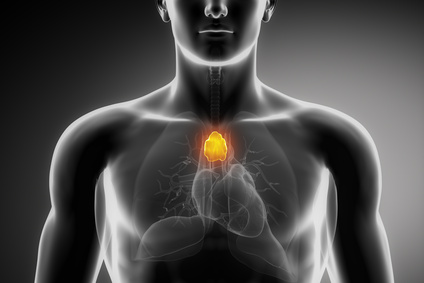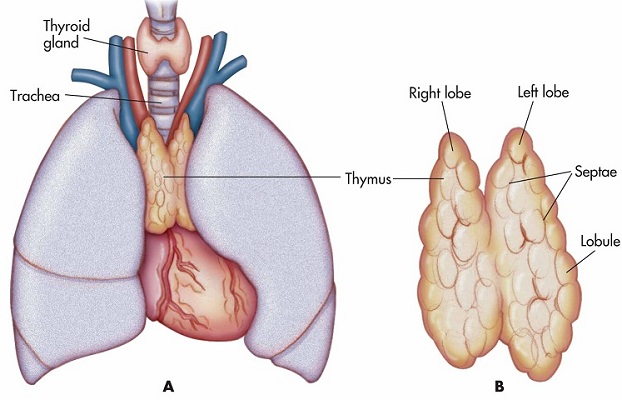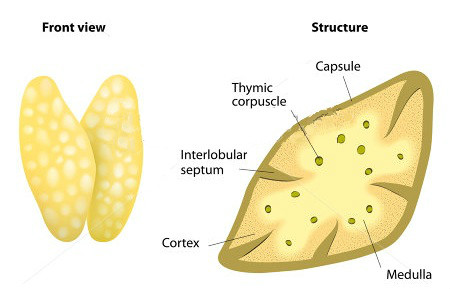Located in the upper chest, the thymus gland is a part of the endocrine system and produces several hormones. At the same time, it helps boost your immunity by playing a role in the development of a special type of white cells called T-cells. The gland makes it possible for T-cells to find and attack foreign bodies without causing any harm to the good cells. Is the function limited to this? Let's find out more.

Thymus Gland Functions
The primary function is to produce cells that move to your organs and defend you from antibodies and germs. Here is more about the functions of thymus glands.
1. Produce and Process T-Cells
The gland produces T-cells to strengthen your immune system. T-cells or lymphocytes are white blood cells that travel to the lymph nodes and the spleen after they become mature. These lymphocytes play an important role in the production of antibodies that help fight against bacteria, viruses, and other pathogens.
2. Secrete Thymopoietin
One of the thymus gland functions is to produce a hormone called thymopoietin. It is actually a protein found in messenger RNA (mRNA) and encoded by the TMPO gene. At the same time, the gland produces the thymosin hormone that plays a big role in stimulating lymphocytes as well as other lymphatic organs.
3. Prevent Anomalous Cell Growth
It also plays a role in the prevention of anomalous cell growth that often leads to tumors, malignancy, and cancer. The T-cells first move from bone marrow to the gland and stay in the thymus gland until they become active. They enter the bloodstream after maturation and then move to the lymphatic organs to boost the defense mechanisms.
Disorders of Thymus Gland
There will be certain complications when the gland fails to function properly. Here are some of the disorders and their effects.
1. SCIDs
Although rare, SCIDs is a genetic defect that occurs when the sufferer has a gene mutation that affects the normal growth of T-cells. About nine different known genes can have the mutations that eventually lead to the form of SCIDs. The condition affects a child's immune system in a big way and the only option for the child is to live in a sterile environment.
2. DiGeorge Syndrome
This genetic disorder occurs when there is a piece of a chromosome missing or deleted. This results in poor development of other organs in the immune system, including the thymus. The severity of the symptoms depends on the severity of the disorder. This lifelong condition usually affects infants and children, and the most common signs are underdeveloped jaw, delayed development, delayed speech, and learning disabilities.
3. Carcinomas
Two different types of carcinomas can develop in the thymus–namely thymic and thymomas. Both types of carcinomas result in cellular growth on the outside surface of the gland, but thymomas cells grow a lot slower than thymic cells. People with an autoimmune disorder are usually at an increased risk of developing thymomas carcinomas. The most common symptoms include chest pain, trouble breathing, and a persistent cough.
4. Other Disorders
Caused by acetylcholine receptors, myasthenia gravis is another rare autoimmune condition. It usually occurs due to thymic hypertrophy. Another rather common disorder is thymus enlargement or thymic hyperplasia.
Treatments for Thymus Gland Disorders
It is possible to control different types of thymus disorders and regain thymus gland function.
- Bone marrow transplant has really helped treat genetic disorders such as SCIDs.
- Gene therapy is another effective treatment option.
- You may require thymus transplant in case you are a victim of DiGeorge syndrome, but that is only in severe cases because milder forms of DiGeorge syndrome can effectively be treated with an infusion of immune cells.
- Certain medications are available to treat myasthenia gravis.
- Treatments vary a lot for cancer of the thymus, but the most common options are radiation therapy, chemotherapy, and drugs.
Anatomy of Thymus Gland
Positioned in the upper chest cavity, the thymus gland is actually a two-lobed structure that extends partially into the neck region. It is precisely located right about the pericardium of the heart, below the thyroid and between the lungs. The thymus has two lobes, each of which has smaller divisions known as lobules.

The medulla is the inner area of the lobule, whereas the outer area is called the cortex. Immature T-lymphocytes stay in the cortex region, whereas the medulla region contains the mature T-lymphocytes. Only the mature cells can identify foreign cells.

The gland has a thin outer covering and consists of three different types of cells–lymphocytes, epithelial cells, and neuroendocrine cells. Epithelial cells give structure to the thymus, neuroendocrine cells release hormones, and lymphocytes protect you against infections.
